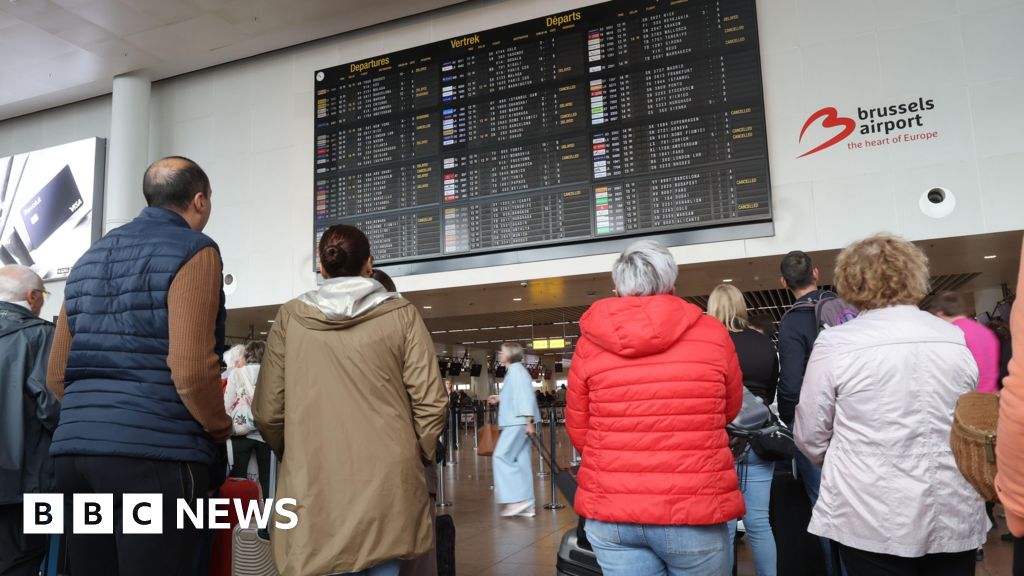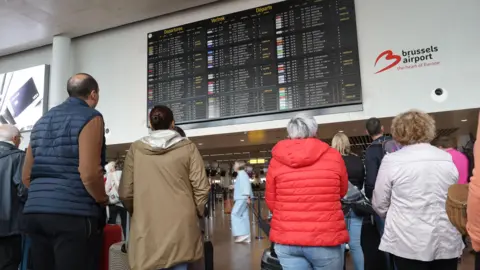Business
EU cyber agency says airport software held to ransom by criminals

Joe TidyCyber correspondent and
Tabby Wilson
 EPA
EPAThe EU’s cyber security agency says criminals are using ransomware to cause chaos in airports around the world.
Several of Europe’s busiest airports have spent the past few days trying to restore normal operations, after a cyber-attack on Friday disrupted their automatic check-in and boarding software.
The European Union Agency for Cybersecurity, ENISA, told the BBC on Monday that the malicious software was used to scramble automatic check-in systems.
“The type of ransomware has been identified. Law enforcement is involved to investigate,” the agency said in a statement to news agency Reuters.
It’s not known who is behind the attack, but criminal gangs often use ransomware to seriously disrupt their victims’ systems and demand a ransom in bitcoin to reverse the damage.
The BBC has seen internal crisis communications from staff inside Heathrow Airport which urges airlines to continue to use manual workarounds to board and check in passengers as the recovery is ongoing.
Heathrow said on Sunday it was still working to resolve the issue, and apologised to customers who had faced delayed travel.
It stressed “the vast majority of flights have continued to operate” and urged passengers to check their flight status before travelling to the airport.
The BBC understands about half of the airlines flying from Heathrow were back online in some form by Sunday – including British Airways, which has been using a back-up system since Saturday.
Continued disruption
The attack against US software maker Collins Aerospace was discovered on Friday night and resulted in disruption across several airports on Saturday.
While this had eased significantly in Berlin and London Heathrow by Sunday, delays and flight cancellations remained.
Brussels Airport, also affected, said the “service provider is actively working on the issue” but it was still “unclear” when the issue would be resolved.
They have asked airlines to cancel nearly 140 of their 276 scheduled outbound flights for Monday, according to the AP news agency.
Meanwhile, a Berlin Airport spokesperson told the BBC some airlines were still boarding passengers manually and it had no indication on how long the electronic outage would last.
It is understood that hackers behind the attack targeted a popular checking software called Muse.
Collins Aerospace has not explained what happened or told the public how long things will take to be resolved. The company is still referring to it as a ‘cyber incident’.
In a statement on Monday morning, the software provider said it was in the final stages of completing necessary software updates.
The internal memo sent to Heathrow staff, seen by the BBC, says more than a thousand computers may have been “corrupted” and most of the work to bring them back online is having to be done in person and not remotely.
The note also says that Collins rebuilt its systems and relaunched them only to realise the hackers were still inside the system.
In separate advice to airlines, Collins told staff not to turn off computers or log out of the Muse software if they were logged in.
The company declined to comment on the memo and its contents.
Ransomware attacks are a prolific problem for organisations around the country, with organised cyber crime gangs earning hundreds of millions of dollars from ransoms every year.
In April, UK retailer Marks and Spencer was hit by ransomware that cost it at least £400m to recover from and months of disruption. The company has declined to say if it paid attackers a ransom.
A spokesperson for the UK’s National Cyber Security Centre said on Saturday it was working with Collins Aerospace, affected UK airports, the Department for Transport and law enforcement to fully understand the impact of the incident.
Cyberattacks in the aviation sector have increased by 600% over the past year, according to a recent report by French aerospace company Thales.
Business
Craft beer brewer BrewDog could be broken up as sale process begins

Beermaker BrewDog could be broken up after consultants were called in to help look for new investors.
The Scotland-based brewer, which makes craft beer such as Punk IPA and Elvis Juice, has appointed consultants AlixPartners to oversee a sale process.
Last month, BrewDog announced it was closing its distilling brands, sparking concerns for jobs at its facility in Ellon, Aberdeenshire.
The company, which was founded in 2007, said it made the decision to focus on its beer products.
No decision has been made in respect of the sale process.
A spokesperson for BrewDog said: “As with many businesses operating in a challenging economic climate and facing sustained macro headwinds, we regularly review our options with a focus on the long-term strength and sustainability of the company.
“Following a year of decisive action in 2025, which saw a focus on costs and operating efficiencies, we have appointed AlixPartners to support a structured and competitive process to evaluate the next phase of investment for the business.
“This is a deliberate and disciplined step with a focus on strengthening the long-term future of the BrewDog brand and its operations.
“BrewDog remains a global pioneer in craft beer: a world-class consumer brand, the number one independent brewer in the UK and with a highly engaged global community.
“We believe that this combination will attract substantial interest, though no final decisions have been made.
“Our breweries, bars, and venues continue to operate as normal. We will not comment on any further speculation.”
Brewdog operates 72 bars around the world as well as four breweries.
Business
‘Better to abolish RERA’: Supreme court says law helping defaulting builders

New Delhi: The Supreme Court has raised serious concerns over how real estate regulatory authorities are functioning across the country. Taking a sharp view, the top court said it may be “better to abolish” these bodies, suggesting they have failed to protect homebuyers and instead appear to benefit defaulting builders. The court added that states should reconsider the very need for such authorities if they are not serving their intended purpose.
A Bench led by Chief Justice of India Surya Kant and Justice Joymalya Bagchi said states should rethink the original purpose behind introducing RERA. The court observed that instead of protecting homebuyers, the law appears to be helping defaulting builders and not serving its intended role.
Expressing strong concern, CJI Surya Kant said states should reflect on the purpose for which RERA was created. He suggested the institution is failing to serve homebuyers and instead appears to benefit defaulting builders. “All states should now think of the people for whom the institution of RERA was created. Except facilitating builders in default, it is not doing anything else. Better to just abolish this institution,” CJI Kant said, quoted by Bar and Bench.
Last year, the High Court had stayed the state government’s decision to shift the RERA office, pointing out that the move was taken “without even identifying an alternative office location”. The court also noted that transferring 18 outsourced employees to other boards and corporations, as requested, “would render the functioning of Rera defunct”.
The Supreme Court, however, set aside the High Court’s order and allowed the state government to shift the RERA office to Dharamshala. It also permitted the relocation of the appellate tribunal to the same location. “With a view to ensure that persons affected by Rera orders are not inconvenienced, the principal appellate is also moved to Dharamshala,” the apex court said.
What Is RERA And Why It Matters
RERA, introduced in 2016, was aimed at addressing project delays, improving transparency and safeguarding homebuyers’ interests. Earlier, each state and union territory operated its own RERA website. However, in September 2025, the Ministry of Housing and Urban Affairs launched a unified RERA portal that brings together data from across states and UTs on a single platform.
Business
SEBI Proposes Overhaul Of Gold And Silver ETF Price Bands After Sharp Swings

Last Updated:
SEBI proposes stricter base price and band rules for gold, silver ETFs, including cooling-off periods after sharp global price swings to curb volatility.


Amid Global Commodity Volatility, SEBI Plans New Price Band Rules for Gold, Silver ETFs
The market regulator has sought to curb extreme volatility in gold and silver Exchange Traded Funds (ETFs) by proposing changes to the base price and price band framework. Currently, there are no separate price bands for ETFs aligned with their underlying assets, making them vulnerable to sharp price movements.
The proposal comes after sharp volatility in gold and silver ETFs triggered by fluctuations in global commodity prices. On some days, these ETFs fell by over 15%, while on others, they recorded sharp gains.
Stock exchanges currently apply a fixed price band of plus or minus 20% on the base price of ETFs, except for Overnight ETFs investing only in TREPs, which have a price band of plus or minus 5%.
Moreover, the base price for applying price bands to ETFs is taken as the T-2 day closing Net Asset Value (NAV) by exchanges, instead of the T-1 day closing NAV or price, as is the case with indices and individual stocks. This creates a challenge, as the closing NAV of ETFs typically differs between T-1 and T-2 days. Corporate actions such as bonuses and dividends are adjusted manually, increasing the risk of errors.
What Are the Key Proposals?
SEBI has proposed that the base price be determined using either the closing price of the ETF on T-1 day (weighted average price of the last 30 minutes), the closing NAV of T-1 day, or the average indicative NAV (iNAV) of the last 30 minutes of T-1 day.
Further, the regulator has proposed an initial price band of plus or minus 10% for equity and debt ETFs, which can be flexed up to plus or minus 20%. A cooling-off period of 15 minutes will apply, and up to two flexes will be allowed in a day.
For gold and silver ETFs, the regulator has proposed an initial price band of plus or minus 6%, which can be flexed up to plus or minus 20%. This will also include a 15-minute cooling-off period.
February 14, 2026, 16:08 IST
Read More
-

 Entertainment1 week ago
Entertainment1 week agoHow a factory error in China created a viral “crying horse” Lunar New Year trend
-

 Business4 days ago
Business4 days agoAye Finance IPO Day 2: GMP Remains Zero; Apply Or Not? Check Price, GMP, Financials, Recommendations
-

 Tech1 week ago
Tech1 week agoNew York Is the Latest State to Consider a Data Center Pause
-

 Tech1 week ago
Tech1 week agoNordProtect Makes ID Theft Protection a Little Easier—if You Trust That It Works
-

 Tech1 week ago
Tech1 week agoPrivate LTE/5G networks reached 6,500 deployments in 2025 | Computer Weekly
-

 Fashion4 days ago
Fashion4 days agoComment: Tariffs, capacity and timing reshape sourcing decisions
-

 Business1 week ago
Business1 week agoStock market today: Here are the top gainers and losers on NSE, BSE on February 6 – check list – The Times of India
-

 Business1 week ago
Business1 week agoMandelson’s lobbying firm cuts all ties with disgraced peer amid Epstein fallout






